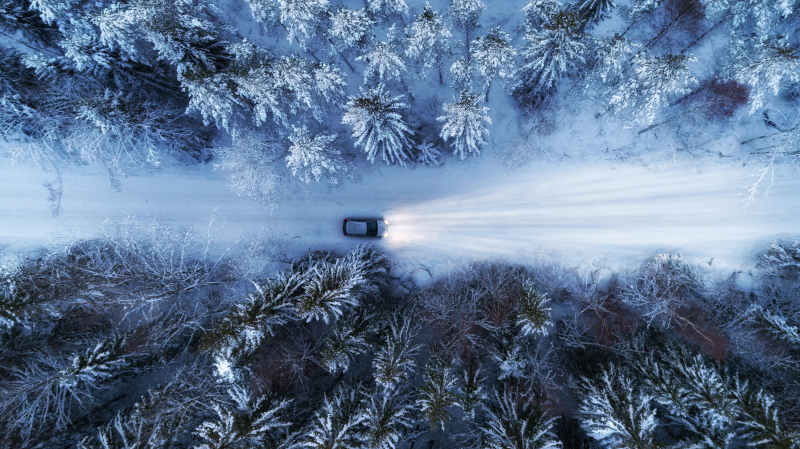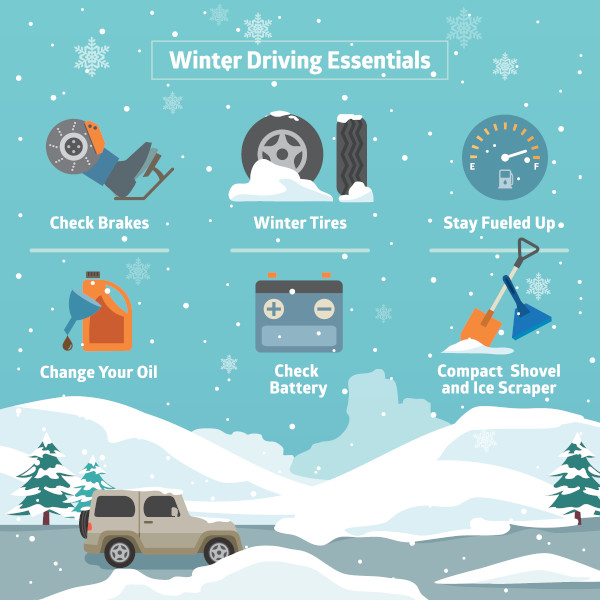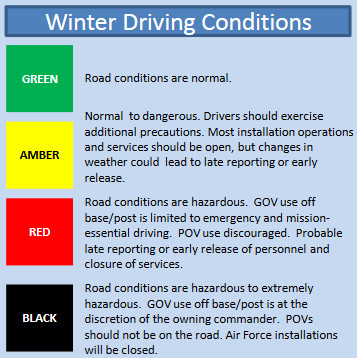
Safety Tips for the Winter Season
It’s that time of the year again! While it’s getting cold and frosty outside, many people tend to stay inside and enjoy the coziness and safety within their own four walls. But wait, there’s that one thing you still need to get from the store. Or maybe you you’re heading out to enjoy the holidays together with loved ones.
That probably means taking the car for a ride. But with temperatures dropping to an all-year low, driving around on the streets might become a bit more tricky. Snow and frozen streets make for real hazards and cause some to overestimate their car’s capabilities to keep them safe.
So, what can you do to avoid getting yourself in some very inconvenient situations like sliding off the road, or maybe even crashing into someone else’s car and potentially ruining everyone’s holidays? We rounded up some useful winter car safety tips for you, that we think will help everyone stay safe on the road and, even if something does happen, guarantee that you are still a 100% covered by your insurance policy. While some may seem common sense, others might be surprising to even the most experienced drivers.
First, some of the most common ones:

Check Brakes
You don’t want to know the number of people who overestimate the power of their car’s brakes, especially when you’re driving on what at times can literally be a layer of pure ice. So, ensuring that they function in the first place is essential before taking the first winter cruise of the year.
Extra tip: if the situation calls for a full brake, try to avoid hasty steering maneuvers to stay in control of the direction your car is going as much as possible.
Winter Tires
There’s at least two very good reason why you should switch to winter tires in the O-to-E (October to Easter) season. Reason one: winter tires are designed to be more flexible and therefore give you more grip on even the most slippery slopes. Under extremely snowy conditions, it might even be a good idea to add snow chains. But there’s another very good reason for you to equip your beloved car with winter tires: if you get caught with summer tires on icy roads, you will get fined. Additionally, in case of an accident, you risk losing your insurance coverage and nobody wants to ruin their holidays worrying about how to pay for potential damages. That’s why it’s always better to make sure, you get them on time.
Stay Fueled Up
This of course is something that you should be aware of all year long, but especially in winter, when traffic jams become more common and you spend more time in the lower gears, where cars might end up using more fuel than usual. By making sure that you don’t end up driving too long on your fuel reserves, you lower the risk of getting stuck in a place where you must call someone to bring you fuel or having to call a tow truck. It can also become a real road hazard (especially on the Autobahn) because you are not allowed to stop unless it is unavoidable. Running out of fuel is not considered unavoidable and may bring you an unnecessary fine.
Change your Oil
Running out of oil is one of the worst things that can happen to your car, as it can cause serious damage to the engine and could even mean the end of its lifetime. Old oil can be as just as dangerous, as it will lose its lubricant feature. Most manufacturers recommend in their service manuals to change the oil every 7,500 – 10,000 miles. Keep that in mind if you want to enjoy the convenience of your vehicle for a long time.
Check Battery
We all know how annoying it can be if your battery dies in the cold. Cameras, mobile phones, and basically every electrical device running on batteries is prone to this phenomenon. And you certainly don’t want this to happen to your car, that you might need for your everyday drive to work or for getting groceries. Lead-acid batteries supposingly drop in capacity by about 20 percent in normal to freezing weather, and down to about 50 percent in temperatures that reach about -22 degrees Fahrenheit. As a result, you may find your car battery giving out on any given winter morning. That’s why you should absolutely avoid things like leaving the lights on overnight or using the car’s stereo without the engine running. Might seem like common sense, but it still happens to people every now and then.
Shovel and Ice Scraper
Luckily in Germany, very heavy snowfalls are a rather rare sight, but depending on where you live, this might even be common during winter season. That’s why it can always come in handy to drive around with a compact shovel to clear the path before you. Ice scrapers, however, will come handy whenever temperatures drop below the freezing point, which often happens during the night. There are other alternatives like covering your windshield with a freeze-protective foil overnight or using anti-frost sprays in the morning. But keeping an ice scraper in your car will always be a reliable solution to frozen windshields, even if it means a little fitness exercise.
Cold Weather Driving Tips
Even when streets have been treated, there are a few general things to consider when driving around on icy roads. For example, reducing your driving speed and increasing distance to the car ahead of you will significantly reduce the risk of ending up on their bumper. Your car’s brakes might stop your tires from turning, but that won’t help a lot if the road is icy and braking distance increases exponentially. So set aside some extra time to complete your journey, make sure to drive with care and even think ahead.
All-Wheel-Drive & 4-Wheel-Drive
Living in modern times comes with the benefits of advanced car technology. All-wheel-drive(AWD) and 4-wheel-drive(4WD), for example, enable you to get up hills more easily, even if they are full of dirt or snow. Maybe that’s a reason for you to consider adding AWD or 4WD to the list of features next time you decide to get yourself a new car.
Wiper Blades and Windshield Washer Fluid
It is really common for your windshield fluid jets to freeze in low temperatures. As winter season also seems to be the time when cars look dirtier than in any other time of the year, adding antifreeze liquid will help keep your windshield nice and clean to guarantee a clear view on the road. Should you run out of fluid for your windshield, a visit to a gas station will help a bit. It comes free so just pick up one of the water cans and pour some water into your washer fluid tank. This will help keeping a clear view at least temporarily. But liquid alone won’t clean your windshield. When your windshield blades age too much, all they’ll do is spread dirt all around the glass instead of wiping it away, so make sure to replace them as soon as you notice them not serving their purpose effectively.
Tire Pressure
We already talked about getting winter tires for more grip on slippery roads, but keep in mind: without the required tire pressure you’re still risking your safety on the street. Check your driver’s manual for the recommended tire pressure for your car and you’ll be good to go.
Emergency Supplies
Expect the unexpected and keep some supplies in your car. That includes the legally required first-aid-kit, but also general maintenance tools like jumper cables, a tire pressure gauge and an air compressor. It is also handy to have some everyday items like a flashlight, blankets and maybe even non-perishable food in case you get stuck and become desperately hungry. More of a nice-to-have than a must, but maybe you’ll thank yourself someday.
Did you know?
The US Military website provides you with live information about weather conditions in your area. The color system as seen below shows exactly, how careful you should be while out on the streets.

Find the US Military road conditions website here.
We hope that you found this list useful and maybe it even reminded you of some stuff that you’ve been wanting to do for quite some time already but didn’t find the right time to do. Winter surely gives you a reason or two to consider following some of this list’s tips. Stay safe!
